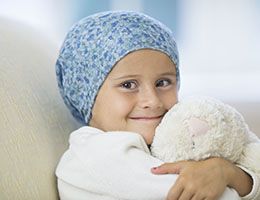Childhood cancer: Coping with a diagnosis

When a child has cancer, children and their parents need support. Get tips for coping with the shock of a diagnosis and learn how to navigate a new normal.
A child's cancer diagnosis can shake any family to the core. Thankfully, there is often reason to be hopeful. According to the American Academy of Pediatrics (AAP), more than 80% of childhood cancers can now be cured or controlled.
But while that statistic offers some comfort, families have a lot to deal with as they begin to confront cancer, especially in the first few weeks.
To help you at the start of this journey, read these coping tips especially for kids and their parents.
How to help your child
For a child who has cancer, life undeniably changes. Activities may be put on hold. Children may feel fearful, anxious, sad and stressed. These tips for parents from the National Cancer Institute (NCI), the AAP and other experts can help your child cope:
- Be open and honest. Your instinct may be to protect your child from bad news, but honest information builds trust. And it may keep kids from imagining the worst about their disease. Of course, how you talk to your child about cancer and its treatments will depend on your child's age. Your child's cancer team can suggest ideas for talking with your child.
- If your child asks questions you can't answer, talk to the doctors and find the answers together. Younger kids may have lots of questions. Teens may worry about how cancer will change their lives, friendships and activities.
- Encourage your child to share feelings with you, another trusted adult or a healthcare provider.
- Try to stay hopeful and calm. This doesn't mean you should suppress your true feelings, however.
- Keep your child's routine as normal as possible. Help your child stay in touch with friends. Ask the care team and the school how your child can keep going to classes or keep up with assignments.
- Give your child lots of love and hugs. Reassure your kiddo that you'll always be there.
How to cope as a parent
If you've just learned your child has cancer, you may experience a range of difficult emotions, such as shock, fear, anxiety, sadness, guilt and anger. These are all normal reactions, according to the American Cancer Society (ACS).
Here are some ideas that may help:
- Lean on a family member or a close friend. Talking about your feelings helps.
- Talk to parents of other children with cancer. Your child's doctor may be able to refer you to a support group for parents.
- Find a private space to vent your anger. It's OK to scream or cry.
- Don't blame yourself. No one knows exactly why one child gets cancer and another does not.
- Learn about your child's cancer from reliable sources, like your child's care team, the ACS and the NCI. Have the healthcare team repeat any information you don't understand. And consider getting a second opinion.
Dealing with stress and change
Cancer can bring a lot of daily stress and disruptions. These tips may make it easier to get through this difficult time:
Ask for help. Family and friends may want to help, but they might not know how. Tell them what you need, whether it's assisting with household chores or driving your other children to school.
Talk with your employer. Programs may be available to help you take time off or work from the hospital during your child's treatment.
Maintain relationships. Cancer can strain marriages and friendships. One way to keep yours healthy is to make time for each other, even if it's just a few minutes spent together. If you can't connect in person, send a quick phone call or a text.
Ask the cancer team about cancer services for families, such as:
- A patient advocate to help your family understand the cancer journey and the tests and procedures your child may need.
- Referrals to resources at the cancer center or in your community. These may include rides to treatment, lodging or financial assistance.
- Counseling to help you or your child handle difficult emotions.
Want to know more? The NCI has more information to help families cope with cancer.
Reviewed 8/28/2024